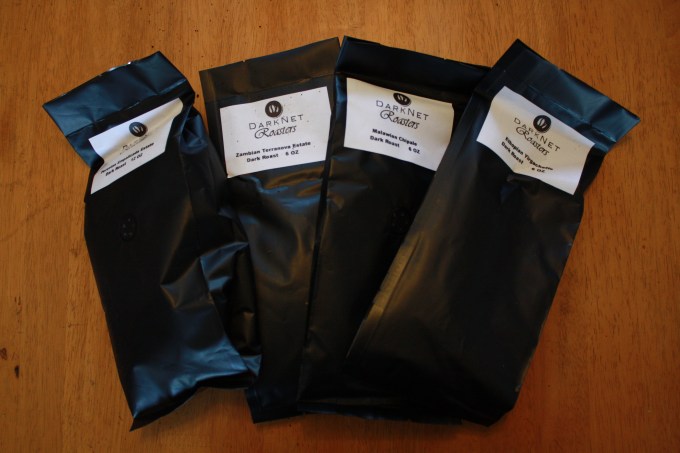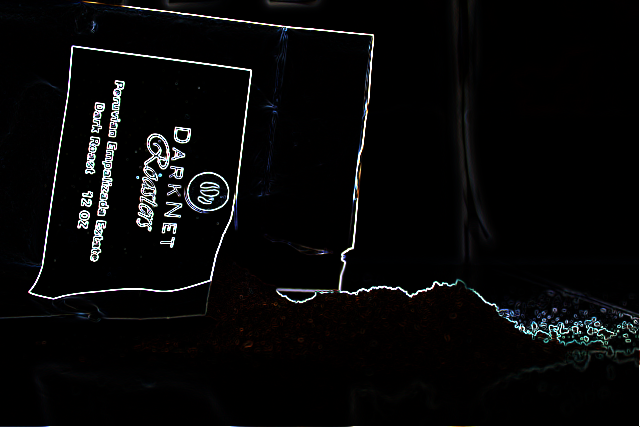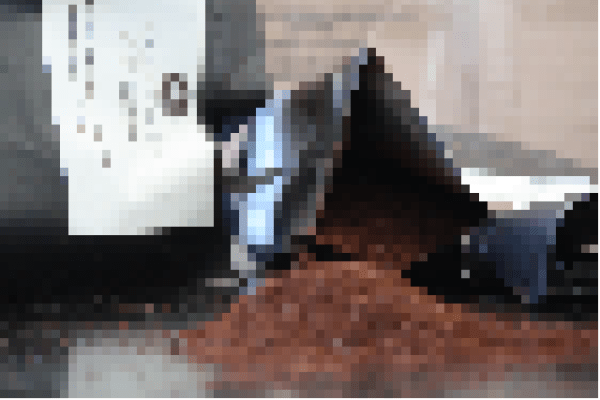Everything is for sale in the dark web marketplaces. Anonymous buyers can procure everything from prescription painkillers to exotic designer drugs. You can hire sex workers and buy weapons in the same exchange. Danger lurks around every corner and Satoshis flow like water while whales make it rain on encrypted Tor gambling servers.
But not everything on the dark web can kill you or bring you down. One established drug vendor has recently branched out to sell old fashioned coffee, which they say they procure directly from farmers, roast themselves, and describe in loving language that wouldn’t be out of place in an organic grocery store.
Welcome to the nicer side of the dark web, where things look more like Whole Foods than Blade Runner.
“We are all long time coffee drinkers,” said an anonyous representative of Dark Net Roasters in an online interview. “Coffee has always been our favorite caffeinated drink.”
It may be lawful to sell caffeine, but the operation is still tied up in the sale of illegal drugs. The experiment started, in fact, as a promotion by an established seller of edible cannabis products: buy a brownie or a rice crispy treat laced with THC, get a complimentary six ounce bag of coffee. The reception was positive, the representative said, and they decided to spin Dark Net Roasters off as its own entity.
“Once we realized how much everyone was enjoying our coffee it was a natural progression to want to offer them to others,” said the representative, who told me that roasting coffee started out as a hobby that they shared with family and friends.
Why sell their coffee on the dark web, where Amazon-like marketplaces can only be accessed on the anonymizing service Tor? The Dark Net Roasters representative said it was an ideological decision to avoid what they see as unnecessary red tape and oversight—and also a bid to capitalize on a population that’s already making regular purchases on the online black market.
“The Internet is inherently a disruptive technology that fosters competition and innovation,” they said. “However, with the Internet sales tax looming, net neutrality, other noncompetitive legislation and the extent of which the government has been gathering information on its citizens, the dark net and digital currencies become the instinctive solution.”
Selling legal goods on darknet marketplaces isn’t unprecedented. On the Silk Road, an early marketplace that was shut down in a high-profile sting last year, one merchant sold caramel candies that earned positive reviews.

I needed to try this encrypted dark roast myself so I obtained four bags of Dark Net Roasters coffee, which are deep black and emblazoned with a pixelated logo, and were delivered by USPS in a nondescript parcel.
Dark Net Roasters describes their roasts in language normally associated with boutique retailers. Their Ethiopian Yirgacheffe features “deep flavors of cherry, stone fruit, violet and cocoa,” according to an official product listing, and their Zambian Terranova has “hints of apple, vanilla and citrus.” Some are advertised as Fair Trade, and others as cultivated sustainably.

Not all those claims are testable, but I wondered how an experienced coffee taster would feel about the product. I arranged to prepare and taste the samples with Peter Cannon, the technical director for artisanal Massachusetts roaster Barismo. In addition to his work with Barismo, Cannon has been involved for years with exacting barista competitions and, in layman’s terms, is obsessed with coffee.
A few things jumped out at Cannon, who emphasized that he spoke only for himself and not his employer, before he even opened the packaging. Two of the bags were leaking when they arrived, which he said can allow the flavor fade more quickly than it would from a sealed container. There was also no roast date on the bags, and the coffee arrived pre-ground, both rarities in high quality coffee—though Dark Net Roasters told me later that they plan to offer whole bean coffee in the future, and that roast dates were a possibility as well.
Cannon prepared and tasted all four roasts by pouring hot water over the grounds, brewing them for four minutes and then carefully smelling and sampling each with a deep spoon, a ritual known as “cupping” in roasting and barista circles. The bottom line, he said, is that all four samples are extremely, unusually dark—though he conceded there is a deep divide in the contemporary roasting world between light and dark coffees, and that he personally prefers light roasts.
As a professional operation, Cannon said, he would have expected better. The four roasts were “incredibly uniform,” he said, grimacing. “When I taste the cup, I just get dark and ash.”
Very dark roasts, Cannon said, are frequently seen as a tactic to overwhelm delicate flavors, covering up a lack of confidence in in the bean or the roasting technique.
“I’m going to guess this is some guy in his kitchen,” Cannon said. He paused. “Or his meth lab, or whatever.”
Cannon’s best guess is that the outfit is not yet large enough that they are looking seriously at consistency between batches, which makes quality control difficult at a commercial level.
He also pointed out that direct trade hinges on transparency. Dark Net Roasters can advertise that their coffee is sourced from a specific region or that they have sought out relationship with a particular grower, but with no paper trail, those claims can’t be verified. And in any case, many coffee aficionados today expect a roaster to provide information on the origin of beans down to the specific farm and elevation where they were grown, which would be a security risk for an anonymous seller.
Would Cannon buy Dark Net Roasters on his own dime?
“I think it’s safe to say ‘no,'” he said (Cannon later revised his opinion further, tweeting that it was “the grossest coffee I’ve had all year.”)
Of course, others might feel differently, and that’s not incompatible with Dark Net Roasters’ laissez-faire philosophy: ultimately, the market will decide.
“We are merely using a new choice of market to reach coffee consumers,” the Dark Net Roasters representative said. “We can only offer our coffees to people. We cannot make them buy it. Ultimately, it is the market that will decide if there is a place for us.”
